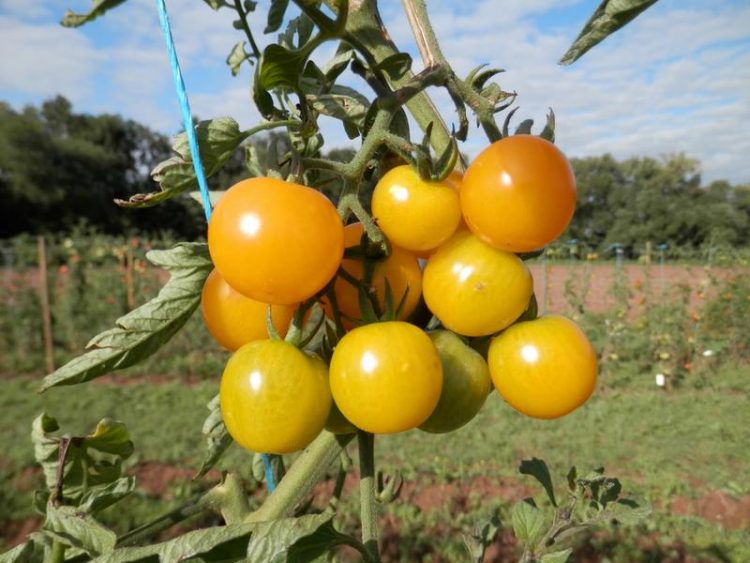Plant breeders of the University of Göttingen und Agrecol test Open Source Seed (OSS) Licence

Tomatoes of the Sunviva variety growing at the University of Göttingen. Culinaris - Saatgut für Lebensmittel
”It is with great concern that we have watched as worldwide access to breeding material is increasingly restricted by private-sector interests. Among other things, patents prevent important traits from being used more extensively in breeding, “ says Dr Bernd Horneburg from the Department of Crop Sciences at the University of Göttingen.
“The movement for seeds to become a commons has become stronger in the last six years – presumably due to growing privatisation and market concentration in the seed sector.”
Such movements are most noticeable in Germany, the USA, India and East Africa. This recent idea means that new varieties are protected by a licence as commons. This means that everyone is allowed to use them, give them away and develop them further – free of charge. Subsequent developments also fall under the licence.
The only condition: to ensure that the seed remains accessible to all, it must not be covered by patents or other exclusive rights. According to the authors, this open source characteristic could even be legally enforced should there be any case of doubt.
Agrecol (Association for AgriCulture and Ecology in Africa, Asia, Latin America and Eastern Europe) promotes site-appropriate land use in developing countries. It is currently testing the Open Source Seed Licence with its Open Source Seeds Programme along with the University of Göttingen and “Culinaris – Saatgut für Lebensmittel”.
“There is great demand from consumers,” says Project Manager Dr Johannes Kotschi. More and more traders are offering licensed tomato varieties. The cherry tomato “Sunviva” from the “Organic Outdoor Tomato Project” of the University of Göttingen was the first tomato variety to get an open source licence in 2017.
“Sunviva” is well suited for gardens and balconies at home; the yellow fruits ripen early in the season. The “Organic Outdoor Tomato Project” is a network in which new, adapted varieties are developed through the free exchange of breeding material and knowledge. Since then, further varieties of tomatoes, maize and wheat have been licensed, and the trend is growing.
Dr Bernd Horneburg
University of Göttingen
Department of Crop Sciences
Section of Genetic Resources and Organic Plant Breeding
Von-Siebold-Straße 8, 37075 Göttingen
Email: bhorneb@gwdg.de
www.uni-goettingen.de/de/48392.html
Dr Johannes Kotschi
OpenSourceSeeds – Agrecol
Johannes-Acker-Str. 6
35041 Marburg
Telefon (06420) 822870
Email: kotschi@opensourceseeds.org
www.opensourceseeds.org
Kotschi J, Horneburg B. “The Open Source Seed Licence: A novel approach to safeguarding access to plant germplasm.” PLoS Biol (2018). https://doi.org/10.1371/journal.pbio.3000023
Media Contact
All latest news from the category: Life Sciences and Chemistry
Articles and reports from the Life Sciences and chemistry area deal with applied and basic research into modern biology, chemistry and human medicine.
Valuable information can be found on a range of life sciences fields including bacteriology, biochemistry, bionics, bioinformatics, biophysics, biotechnology, genetics, geobotany, human biology, marine biology, microbiology, molecular biology, cellular biology, zoology, bioinorganic chemistry, microchemistry and environmental chemistry.
Newest articles

A universal framework for spatial biology
SpatialData is a freely accessible tool to unify and integrate data from different omics technologies accounting for spatial information, which can provide holistic insights into health and disease. Biological processes…

How complex biological processes arise
A $20 million grant from the U.S. National Science Foundation (NSF) will support the establishment and operation of the National Synthesis Center for Emergence in the Molecular and Cellular Sciences (NCEMS) at…

Airborne single-photon lidar system achieves high-resolution 3D imaging
Compact, low-power system opens doors for photon-efficient drone and satellite-based environmental monitoring and mapping. Researchers have developed a compact and lightweight single-photon airborne lidar system that can acquire high-resolution 3D…





















